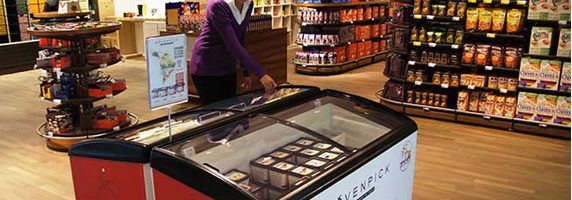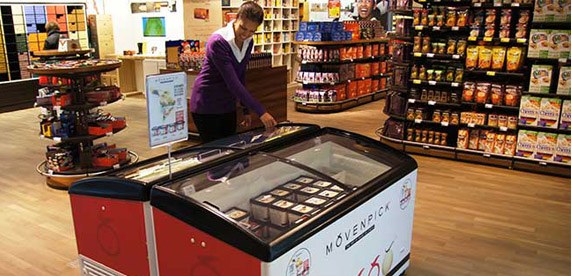Nestlé keeps climate change cool

A glimpse into what the world’s largest food and beverage manufacturer is doing to flight climate change globally.
Nestlé keeps climate change cool
How is the world’s largest manufacturer of food and beverage products reacting to global food security concerns caused by climate change?

Source: Nestlé http://www.nestle.com/csv/environmental sustainability/climate-change
How will Nestlé be impacted by climate change?
Nestlé’s diverse portfolio of global brands each face risks as temperatures rise and climate patterns change throughout the world. The corporation’s entire operating model will be impacted by the agricultural nature of the products they sell. Nestlé is keenly aware that their business will face risks as agricultural yields decline, farming and productive land shifts geographically, and increasingly destructive weather events (drought, floods, storms, etc.) impact their ability to distribute and produce products, and impact their end consumers’ ability to buy (1).
As one of the leading manufacturers of frozen foods (pizza, ice cream, frozen meals), Nestlé relies heavily on refrigeration. Worldwide, Nestlé owns thousands of commercial freezers, located in retail locations across continents. In addition, Nestlé’s supply chain operates transportation of refrigerated products every day (3). However, in recent years, many governments and non-governmental organizations (NGOs) have focused on reducing the use of common, but harmful refrigerants in order to fight against climate change (4).
Specifically, the refrigerant, hydrofluorocarbon (HFC) is extremely harmful to the environment. Just last month, in October 2016, 150 countries met in Rwanda to amend the Montreal Protocol – an international treaty established in 1987 focused on protecting the world’s ozone layer by mandating a phase out of harmful substances responsible for ozone depletion (5). The amendment signed this year by the attending nations established that the wealthier counties would cut back on HFC usage starting in 2019 (4). HFCs are extremely harmful to the environment, and pose “an immediate threat to a safe climate due to their increasing use and high global warming potential, thousands of times more potent than carbon dioxide”(4).
What is Nestlé doing to address the impact of climate change?
One of Nestlé’s first environmental and sustainability goals in the coming years is to transition all of their refrigerated containers from using harmful HFCs to natural refrigerants (1). They have already begun this transition in across European nations (starting in 2013), and have continued to extend their efforts globally in Asia, and the US (3). Instead of HFCs, the substances used “ammonia, water or air and hydrocarbons, like propane and iso-butane” are naturally occurring, do not have a harmful impact on the ozone layer, and have negligible negative impacts on climate change (3).
Beyond their commitment to cutting out HFCs, Nestlé has also established plans to cut down greenhouse gas emissions in their manufacturing operations (by 35%), distribution processes (by 10%), and in warehousing (by 10%); with the goal to reach these reductions by 2020 (1).

What more Nestlé should be doing?
Nestlé’s plan to lower greenhouse gas emissions in their distribution process, though not directly spelled out in their company documents, could additionally be executed on many levels. For instance, in the USA, Nestlé operates an extensive network of direct store delivery (DSD) vehicles which transport frozen goods directly to retailers throughout the country (6). Beyond ensuring that this fleet of temperature-controlled vehicles also make the change to natural non-HFC refrigerants, Nestlé should also think about how to even further reduce these trucks’ carbon footprint and green-house gas emission. One way they could do this is through investing in electric or lower fuel consuming vehicles. This would reduce the environmental impact, and help Nestlé USA save on the transportation cost of their supply chain.
As the world’s largest food and beverage company, Nestlé will be setting the stage for how major corporations react and protect themselves against the future climate change that our world is already approaching. I am hopeful that they will continue to pursue efforts to reduce their impact, even after their 2020 goals are achieved, and eventually pivot fully toward making a positive impact on the environment instead of simply making up for the damages they caused in the past.
[656]
Sources
- “Our Commitment: Provide Climate Change Leadership.” Climate Change Leadership. Nestle, n.d. Web. 03 Nov. 2016. <http://www.nestle.com/csv/environmental-sustainability/climate-change>.
- “What Is Nestle Doing about Climate Change?” Environment. Nestle, n.d. Web. 03 Nov. 2016. <http://www.nestle.com/ask-nestle/environment/answers/nestle-climate-change>.
- “New Nestle Freezers to Help Tackle Climate Change.” Features & Highlights. Nestle, 27 Nov. 2013. Web. 03 Nov. 2016. <http://www.nestle.com/media/newsandfeatures/natural-refrigerants>.
- McGrath, Matt. “Climate Change: ‘Monumental’ Deal to Cut HFCs, Fastest Growing Greenhouse Gases.” Science & Enviornment. BBC News, 15 Oct. 2016. Web. 03 Nov. 2016. <http://www.bbc.com/news/science-environment-37665529>.
- “The Montreal Protocol on Substances That Deplete the Ozone Layer.” U.S. Department of State, n.d. Web. 03 Nov. 2016. <http://www.state.gov/e/oes/eqt/chemicalpollution/83007.htm>.
- Johnson, Karla. “Nestlé Direct Store Delivery.” Nestlé USA (n.d.): n. pag. NESTLÉ USA. Web. 4 Nov. 2016. <http://www.nestleusa.com/asset-library/documents/media/nestledirectstoredelivery.pdf>.



As an influential international corporation, it sounds like Nestlé might need to step up their game. From this post, it does not sound like Nestlé is at the forefront of the industry when it comes to addressing climate change. I too hope they realize the position they are in to serve as leaders in the industry and take that responsibility more seriously. I did appreciate, however, that Nestlé outlined some specific measurable goals regarding GHG emissions. This is at least a start. The issue of refrigerants is interesting and I hope Nestlé’s transition to natural refrigerants influences others to follow suit.
Hartley,
Very interesting post. I also find some of their lack of action a bit concerning considering they are such a large company. I did my post on Anheiser Busch and they also had the same issue with their refrigeration and are doing a similar program to change out the refrigerators at their distributors. I think it is also a great idea to look into their transportation network.
As one of the largest food companies in the world, has Nestle looked into their supplier network? Given the variety of food product they have, I am sure their suppliers are facing a large amount of environmental issues, so perhaps Nestle can enforce some “best of the best” practices on their suppliers to generate a larger amount of environmental progress.
Interesting post Hartley. I never knew about Nestle’s climate change efforts in regards to refrigerators. I wonder how much Nestle has control over the type of refrigerators their third party wholesalers and retailers would use. Is Nestle creating incentives in the process chain to make sure partners are conducting these initiatives.
That being said I also became concerned that Nestle, despite being a leading international food and beverages company, is not at its forefront in climate change actions. Nestle has the potential to set a criteria in the industry as a leading international company – I hope they are at least in the process of planning or conducting actions towards the many environmental issues we have in the world today.
Hey Hartley, nice post. I think one avenue that Nestle can work on to help sustainability, aside from operations, it through marketing. The large multinational has several omnibus and corporate marketing campaigns that they can leverage to communicate the message of sustainability. I believe that by doing so, as the largest food and beverage company in the world, they can instigate thought and discussion behind climate change all across the world. I agree with B6 crewmember, Nestle has to step up and they have to be more creative about it.